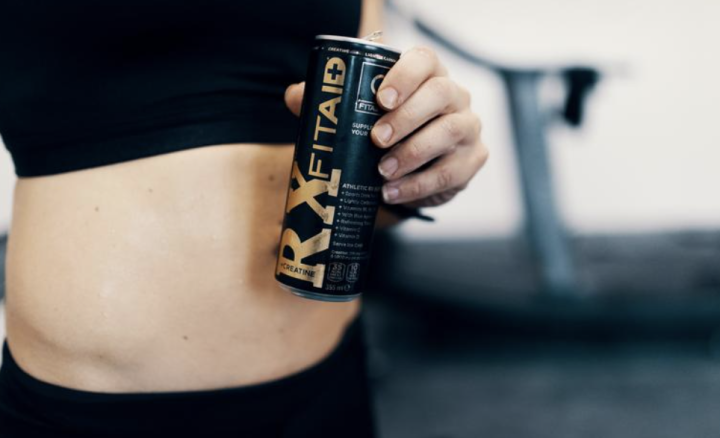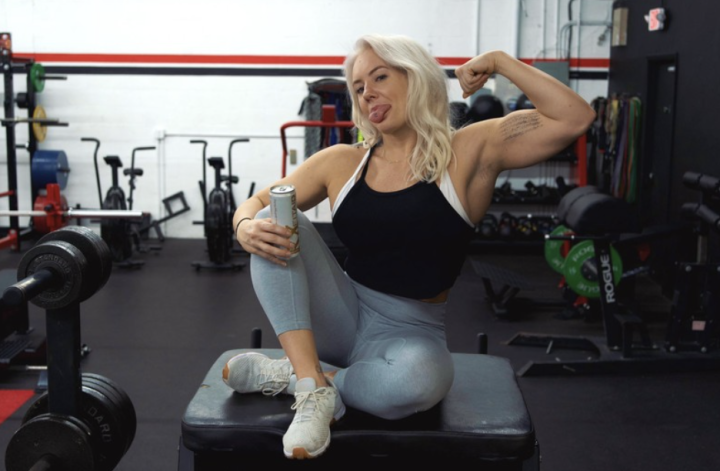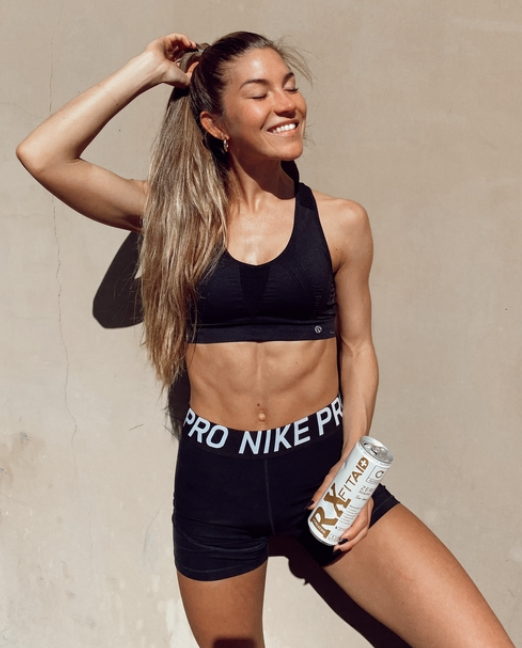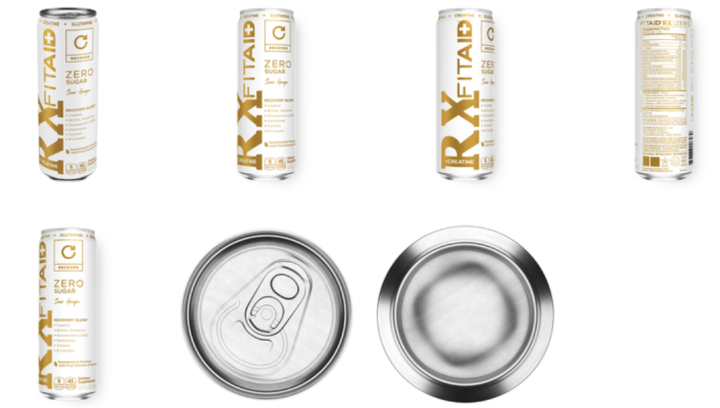Here at FITAID, we feel strongly about a few things: No artificial sweeteners, clean caffeine, quality ingredients and Sports Recovery. You spend so much time in the gym, at work, and showing up for the people around you, that you have to spend the time to recharge and recover.
As the sun sets on another transformative year, we find ourselves reflecting on the incredible journey we've embarked on together. In 2023, we began the Sports Recovery Sunday newsletter to provide weekly tips, tricks and more to help you maximize your recovery and show up as your best, everyday. We believe that the definitive way to boost your performance is to focus on your recovery: physically, mentally and emotionally. How you show up for yourself is how you show up for the rest of the world, and we’re honored to be a small part of it. In this dynamic era of ever-evolving knowledge, we invite you to join us in a retrospective journey through the year's top-clicked resources.
As we unravel what caught your eye on a scroll through your inbox, we're excited to continue to grow together in 2024. The data trails left by your clicks serve as breadcrumbs, guiding us and shaping our understanding of how we can best provide you with the resources you need to succeed.
- TOP 5 RECIPES
- TOP 5 SONGS
- TOP 5 TOOLS
RAVE-WORTHY RECIPES
Protein Pancakes
Featured in SRS # 14
There's nothing quite like waking up on a Sunday morning to the smell of pancakes (even if you have to make them yourself). This recipe is loaded with protein to keep you full and maintain the gainz.
Chicken StirFry
Featured in SRS #15
Throw in veggies, your choice of protein and toss in some sauce for a delicious dinner recipe. It also serves as a great leftover lunch option!
Honey Chipotle Salmon Bowls
Featured in SRS #6
A little sweet, a little spice, and a whole lot of yummy. Level up your cooking skills with this delcious honey chipotle salmon recipe. Served with rice and a cucumber, avocado mixture. Delish!
DIY Protein Cider Doughnuts
Featured in SRS #41
A Fall time favorite: apple cider doughnuts! These homemade treats are a healthier alternative to the sugary doughnut you'd grab at the cider mill, or apple orchard. Packing double the protein and half the calories this recipe is a must try!
Breakfast Egg Muffins
Featured in SRS #33
Perfect for the school year, or commuters, these on-the-go egg muffins are the perfect mix of convenience and nutrition. Say goodbye to morning chaos and hello to hassle-free mornings.
MOST VIEWED SONGS
"Honey" by Kehlani
Featured in SRS #14
"Reasons" - Khalid
Featured in SRS #15
"Springsteen" - Eric Church
Featured in SRS #33
"Saturday Sun" - Vance Joy
Featured in SRS #13
"Sunset Lover" - Petit Biscuit
Featured in SRS #6
TOP CLICKED TOOLS
Recovery Shoes
Featured in SRS #15
Do you know the full impact your shoes have on how the rest of how your body feels? You might be surprised... Check out some of the below recovery footwear to give your feet some love. Have another favorite? Let us know!
Books about Habits
Featured in SRS #41
Habits are the small steps that lead to big transformations. Good habits are crucial to leading a healthy lifestyle. If you're having trouble forming healthy habits, these books are a great place to start! They breakdown building routines and behaviors AND most importantly, staying consistent.
The Power of Habit by Charles Duhigg
7 Habits of Highly Effective People by Stephen R Covey & Sean Covey
Magnesium Lotions
Featured in SRS #33
Lather up! Magnesium lotions aide in relaxation, muscle recovery, and promote overall well-being. The quick absorption helps replenish your body's magnesium levels while nourishing your skin.
Gua Sha
Featured in SRS #39
Face Gua Sha blew up on Tik Tok as a way to chisel chins, but did you know it actually has health benefits? A tool for lymphatic drainage, gua sha works similarly to muscle scraping to promote circulation, reduce inflammation, and relieve muscle tension.
Blue Light Glasses
Featured in SRS #2
What are you go-to recipes? What songs do you chill out to? What is your favorite music genre for productivity? Do you have a recovery tool you swear by? Let us know over on Instagram!
Whether you're an athlete or simply someone leading an active lifestyle, giving your body the time and care it needs to recover is crucial for long-term health and optimal performance. Let’s explore the reasons why recovery holds such significance and how it contributes to overall well-being.
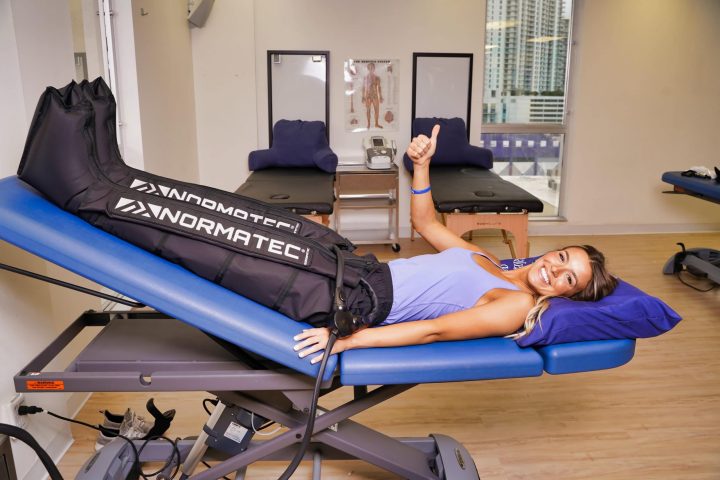
Muscle Regeneration
During physical exercise, our muscles undergo stress and micro-tears, which are essential for strength and growth. These muscles repair and actually grow during the recovery phase. Adequate rest allows your body to rebuild damaged tissues, replenish energy, and optimize protein synthesis.
Prevent Injury
Ignoring recovery results in increased risk of injury. Overtraining or failing to allow your body to heal can lead to chronic fatigue, weakened immune function, and musculoskeletal imbalances. By incorporating appropriate rest periods into your training routine, you reduce the likelihood of overuse injuries, stress fractures, and other ailments associated with excessive strain on the body.
Improve Performance
Contrary to popular belief, pushing yourself harder and longer isn't always the path to improved performance. Recovery plays a fundamental role in optimizing athletic abilities. Rest allows the body's systems, such as the cardiovascular and nervous systems, to recuperate and adapt to the demands placed upon them during exercise. This regeneration of energy, repair of muscle fibers, and restoration of hormonal balance ultimately enhances strength, speed, endurance, and overall athletic performance.
Mental Wellness
Physical activity doesn't just exert a toll on the body; it affects the mind as well. Intense workouts and training schedules can lead to mental fatigue and burnout. Incorporating recovery time helps alleviate stress, promotes relaxation, and restores mental clarity. It provides an opportunity to unwind, rejuvenate, and foster a healthy mindset, ultimately leading to increased motivation and enjoyment in physical pursuits.
Remember: recovery encompasses more than just taking days off from training. It includes prioritizing quality sleep and nourishing your body with proper nutrition. Sleep is vital for the body's restorative processes, hormone regulation, and cognitive function. A well-balanced diet that includes sufficient macronutrients, micronutrients, and hydration supports tissue repair, replenishes energy stores, and aids in optimal recovery.
In the pursuit of athletic excellence or maintaining an active lifestyle, it is imperative to recognize the significance of recovery. Making time for rest, sleep, and proper nutrition allows your body to repair, rebuild, and adapt. Prioritizing recovery not only prevents injuries but also enhances physical performance and mental well-being. So, remember to listen to your body, incorporate rest days, and embrace recovery as an integral part of your journey to a healthier, fitter, and more fulfilling life.
Looking for ways to improve your own recovery? Start by cracking open a can of FITAID and checking out some of our other blog posts on recovery methods & modalities:
5 Essential Active Recovery Tricks
Active Recovery - A Good Reason to Take it Easy
Walk it Off! The Benefits of a Post-WOD Walk.
Why is Stretching Important for Post-Workout Recovery?
Yoga as a Tool for Sports Recovery
Why Do I Need to Use a Foam Roller in my Post-Workout Recovery?
Muscle Scrapers for Post-Workout Recovery
Can Gratitude Help my Fitness Routine & Athletic Performance?
Who needs creatine?
You need creatine.
Why Creatine needs to be part of your supplement mix.
For many years, creatine supplementation has been associated with the fitness industry, particularly for bodybuilders and powerlifters. However, recent studies have shown that creatine can be beneficial for anyone who wants to improve their athletic performance, especially men. In this article, we will discuss the science behind creatine and recovery, debunk myths about creatine being just for "meat-heads," and explain how creatine can help optimize fitness and training for men of all ages.
What is Creatine?
Creatine is a natural compound produced in the body that plays a critical role in energy metabolism. It is primarily found in the skeletal muscles and the brain, and it is made from three amino acids: arginine, glycine, and methionine. Creatine supplementation has become increasingly popular among athletes, particularly those involved in high-intensity activities, as it is known to increase muscle strength and endurance.
Does Creatine Really Work?
Several studies have confirmed that creatine supplementation can improve muscle strength and endurance, as well as increase muscle mass. One study published in the Journal of Strength and Conditioning Research found that creatine supplementation improved maximum strength and power output in weightlifters (1). Another study published in the International Journal of Sports Nutrition and Exercise Metabolism found that creatine supplementation improved endurance and muscle recovery in long-distance runners (2).
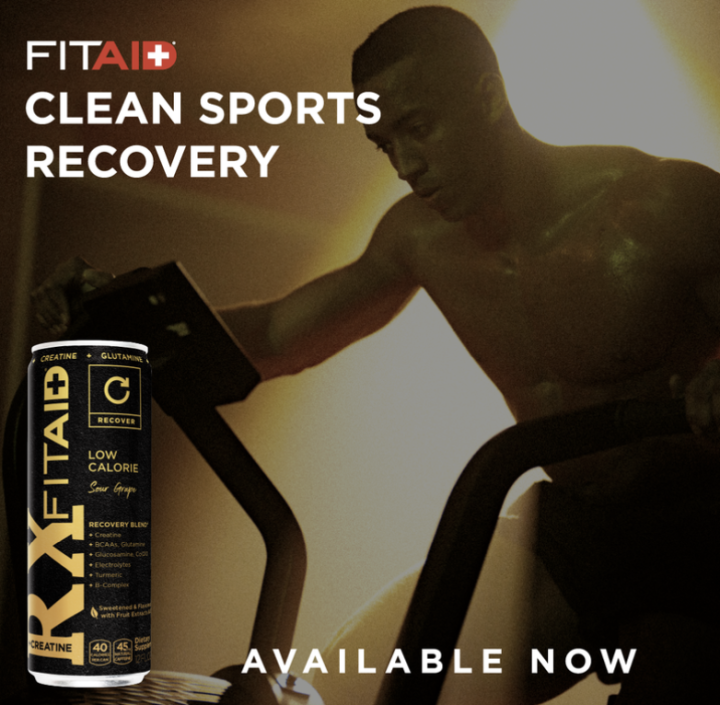
Is Creatine Supplementation Only for People Looking to Bulk Up?
Contrary to popular belief, creatine supplementation is not just for bodybuilders and powerlifters. While creatine can help increase muscle mass, it can also help improve athletic performance in endurance sports, such as running and cycling. Additionally, creatine supplementation can be beneficial for anyone who wants to improve their strength and power output, including older adults.
What is the Science Behind Creatine and Recovery?
During high-intensity exercise, the body relies on ATP (adenosine triphosphate) to provide energy to the muscles. However, the body's ATP stores are limited, and as a result, fatigue sets in. Creatine supplementation can help increase the body's ATP stores, which can improve muscle endurance and delay fatigue. Additionally, creatine supplementation has been shown to reduce muscle damage and inflammation following exercise, which can help speed up recovery time.

How is Creatine Key for Post-Workout Recovery for Men of All Ages?
Creatine is a natural compound that can be found in certain foods, such as red meat and fish. However, it can be difficult to get enough creatine from diet alone, particularly for athletes who have higher energy requirements. By supplementing with creatine, men can increase their muscle strength and endurance, improve their recovery time, and optimize their overall fitness and training.
How to Get More Creatine in Your Diet?
As mentioned earlier, creatine can be found in certain foods, such as red meat and fish. However, it can be challenging to get enough creatine from diet alone, particularly for athletes. The most effective way to increase creatine levels is to supplement with creatine monohydrate. Creatine monohydrate is the most researched form of creatine, and it is considered safe and effective for most people.
FITAID RX Drinks for Post-Workout Recovery:
FITAID RX is a post-workout drink that contains no artificial sweeteners, with no sucralose or aspartame or Ace-K. It has clean caffeine from green tea extract and 1000mg of bonded creatine. FITAID RX comes in two options for sugar content, one sweetened with Raw Organic Agave and the other with monk fruit.
Additionally, FITAID RX contains vitamins and minerals that can help aid muscle recovery, including turmeric, glucosamine, vitamin B12, and BCAAs (bran chain amino acids). BCAAs are a group of essential amino acids that are important for muscle protein synthesis and recovery. Glucosamine is a compound that is naturally found in the body and is often used as a supplement to support joint health. Turmeric is a spice that is known for its anti-inflammatory properties, which can help reduce muscle soreness and inflammation.
Scientific References:
-
- Rawson ES, Volek JS. Effects of creatine supplementation and resistance training on muscle strength and weightlifting performance. Journal of Strength and Conditioning Research. 2003;17(4):822-31.
- Casey A, Constantin-Teodosiu D, Howell S, et al. Creatine ingestion favorably affects performance and muscle metabolism during maximal exercise in humans. American Journal of Physiology-Endocrinology and Metabolism. 1996;271(1):E31-7.
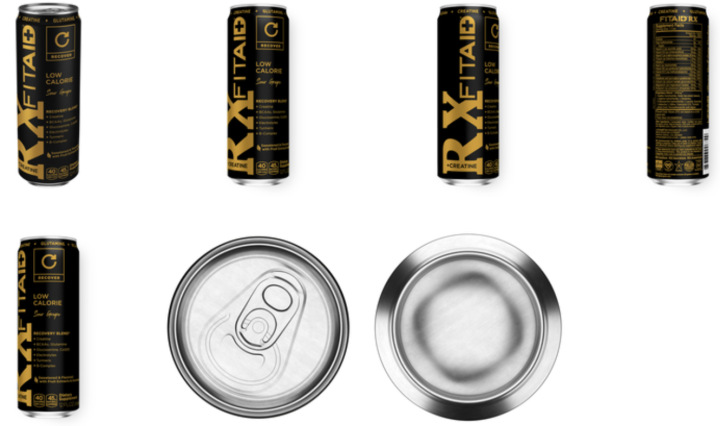 Conclusion:
Conclusion:
In conclusion, creatine supplementation can be beneficial for men of all ages who want to optimize their fitness and training. Contrary to popular belief, creatine is not just for bodybuilders and powerlifters. Creatine can help improve muscle strength and endurance, increase muscle mass, and reduce muscle damage and inflammation following exercise. Additionally, FITAID RX drinks can be an excellent post-workout recovery option for men looking to optimize their recovery time. By incorporating creatine and FITAID RX into their training and fitness routine, men can achieve their fitness goals and improve their overall health and well-being.
Creatine Supplements for Women
So, I heard women should not take creatine.
We call bullshit.
Creatine IS for women. Period.
 (Breanna Cope, WSL Professional Surfer - with FITAID RX)
(Breanna Cope, WSL Professional Surfer - with FITAID RX)
Creatine is a popular supplement among athletes and fitness enthusiasts. It is believed to improve strength, power, and muscle mass. However, there are many myths surrounding creatine supplementation, particularly for women. This blog post aims to debunk these myths and provide an in-depth analysis of creatine and its benefits for post-workout recovery in women. We will also discuss the science behind creatine and recovery, whether creatine supplementation is only for men, what creatine is, and how it works. We will also cover the role of FITAID drinks in post-workout recovery and how they aid muscle recovery.
What is Creatine?
Creatine is a naturally occurring compound found in our bodies, primarily in our muscles. It is produced in our liver, pancreas, and kidneys and is used to supply energy to our muscles during high-intensity activities. Creatine can also be obtained from the diet, particularly from animal sources like beef, pork, and fish.
Creatine Supplementation and Women: Debunking Myths
One of the most common myths about creatine supplementation is that it is only for men. This is not true. While it is true that men have higher creatine levels than women, there is no scientific evidence to suggest that creatine supplementation is harmful to women. In fact, several studies have shown that creatine supplementation can be just as effective in women as it is in men.
Another myth is that creatine supplementation can cause weight gain and bloating. While it is true that creatine can cause the body to retain water, this is not the same as gaining fat. In fact, several studies have shown that creatine supplementation can actually improve body composition by increasing lean muscle mass and reducing body fat.
(Hunter Elam, USA Weightlifting Olympian, with FITAID RX ZERO)
The Science Behind Creatine and Recovery
Creatine supplementation has been shown to improve post-workout recovery by enhancing muscle repair and reducing inflammation. When we exercise, our muscles undergo stress and damage, which can cause inflammation and muscle soreness. A creatine recovery drink helps to reduce inflammation and promote muscle repair by providing energy to the muscles and enhancing the production of adenosine triphosphate (ATP), which is the primary source of energy for our cells.
Is Creatine Supplementation Only for Men?
As mentioned earlier, creatine supplementation is not only for men. Several studies have shown that women can benefit from creatine supplementation just as much as men. In fact, one study showed that women who took creatine for 10 weeks saw an increase in lean muscle mass and a decrease in body fat, without any negative side effects.
Does Creatine Really Work?
Yes, creatine supplementation has been shown to be effective in improving strength, power, and muscle mass. Several studies have shown that creatine supplementation can increase muscle strength and power by up to 20%, particularly during high-intensity activities like weightlifting and sprinting.
Creatine and Post-Workout Recovery for Women
Creatine can play a key role in post-workout recovery for women. As mentioned earlier, creatine helps to reduce inflammation and promote muscle repair, which can help to reduce muscle soreness and improve recovery time. Additionally, creatine supplementation can improve energy levels and cognitive function, which can help to enhance overall performance during workouts.
Getting More Creatine in Your Diet
While creatine can be obtained from animal sources like beef, pork, and fish, it can be difficult to get enough creatine from the diet alone. This is why many athletes and fitness enthusiasts choose to supplement with creatine. The recommended dose of creatine is 3-5 grams per day, which can be taken in a single dose or split into multiple doses throughout the day.
FITAID Drinks and Post-Workout Recovery
FITAID RX, which is a product that is specifically designed for athletes and contains 1000mg of bonded creatine. FITAID RX is formulated to aid in muscle recovery, reduce inflammation from everyday stress, and promote endurance, and contains 1000mg of creatine per serving. FITAID drinks are a great option for post-workout recovery, particularly for women, as they contain a variety of ingredients that can aid in muscle recovery. FITAID drinks contain no artificial sweeteners, sucralose, aspartame, or Ace-K, which can be harmful to the body in high doses.
FITAID RX comes in two options of sweeteners; Raw Agave or No Sugar - happily sweetened with Monk Fruit. FITAID RX also contain clean caffeine from green tea extract, which can help to improve energy levels and cognitive function. This can be particularly beneficial for women who may feel fatigued after a workout.
The vitamins in FITAID RX drinks, such as turmeric, glucosamine, vitamin B12, and BCAAs, can also help to aid in muscle recovery. Turmeric is a natural anti-inflammatory, which may help to reduce inflammation from everyday stress and muscle soreness. Glucosamine is a key component of joint cartilage and may help to reduce joint pain and inflammation from everyday stress. Vitamin B12 is important for energy metabolism, while BCAAs (branched-chain amino acids) are essential amino acids that can help to promote muscle repair and recovery.
Scientific References
Several scientific studies have been conducted on the benefits of creatine supplementation for post-workout recovery in women. One study published in the Journal of the International Society of Sports Nutrition found that creatine supplementation improved muscle strength and power in women and had no negative side effects.
Another study published in the Journal of Strength and Conditioning Research found that creatine supplementation improved muscle endurance and reduced muscle soreness in women after high-intensity exercise.
(Kelsey Keil, Elite CrossFitter and Weightlifter with FITAID RX ZERO)
Conclusion
In conclusion, creatine supplementation can be an effective way to improve post-workout recovery in women. It can help to reduce inflammation, promote muscle repair, and improve energy levels and cognitive function. While there are many myths surrounding creatine supplementation, particularly for women, there is no scientific evidence to suggest that it is harmful or ineffective for women. FITAID drinks are a great option for post-workout recovery, as they contain natural ingredients that can aid in muscle recovery without any harmful artificial sweeteners.
Here are a few links to scientific research on creatine supplementation and women:
- "Effects of Creatine Supplementation on Women's Lower-Body Strength: A Randomized Controlled Trial": This study published in the Journal of Strength and Conditioning Research found that creatine supplementation improved lower body strength in women and had no negative side effects.
- "Effect of Creatine Supplementation on Muscle Strength and Endurance in Female Soccer Players": This study published in the Journal of Sports Science and Medicine found that creatine supplementation improved muscle strength and endurance in female soccer players.
Link: https://www.ncbi.nlm.nih.gov/pmc/articles/PMC4105388/
- "Creatine Supplementation Improves Muscle Strength and Power Output in Women After Resistance Training": This study published in the Journal of Strength and Conditioning Research found that creatine supplementation improved muscle strength and power in women and had no negative side effects.
- "Effects of creatine supplementation on body composition, strength, and sprint performance": This study published in Medicine and Science in Sports and Exercise found that creatine supplementation improved body composition, strength, and sprint performance in women.
Link: https://pubmed.ncbi.nlm.nih.gov/12900686/
These studies provide evidence that creatine supplementation can be beneficial for women in terms of improving muscle strength, endurance, and performance. However, as with any supplement, it's important to consult with a healthcare professional before adding creatine to your routine.
Looking for some Sunday Recovery reading with your ice-cold FITAID? Try...
Book Review of Eat the Yolk
Or just read this review below to impress your friends.
"Eat the Yolks" by Liz Wolfe is a book that challenges many of the commonly-held beliefs about nutrition and offers a more holistic approach to healthy eating. The book is full of practical advice and is written in a humorous and approachable style that makes it easy to read and understand.
Wolfe begins by discussing the history of nutrition and how we've been led astray by various dietary fads and myths. She then delves into the science behind nutrition and explains the benefits of eating a diet that is rich in nutrient-dense, whole foods.
Throughout the book, Wolfe tackles a wide range of topics, from the importance of healthy fats and the dangers of sugar to the benefits of consuming bone broth and fermented foods. She also provides practical advice on how to make healthy choices at the grocery store and in restaurants.
Ultimately, "Eat the Yolks" offers a refreshing perspective on nutrition and encourages readers to embrace a more natural and nourishing approach to eating.
Similar books to "Eat the Yolk"
If you enjoyed "Eat the Yolks" and are interested in similar books, you may want to check out:
-
- "Real Food" by Nina Planck - This book provides a comprehensive guide to eating whole, natural foods and explains the benefits of consuming traditional foods.
- "Deep Nutrition" by Catherine Shanahan - This book explores the connection between nutrition and health, with a focus on the benefits of eating a diet that is rich in healthy fats, nutrient-dense foods, and fermented foods.
- "The Primal Blueprint" by Mark Sisson - This book offers a holistic approach to health and fitness, with a focus on consuming whole, natural foods and engaging in physical activity that mimics our ancestral lifestyle.
- "In Defense of Food" by Michael Pollan - This book provides a thought-provoking analysis of the Western diet and the science behind what we eat, with a focus on the benefits of consuming whole, natural foods.
Looking for some Sunday Recovery reading with your ice-cold FITAID? Try...
Book Review of Sacred Cow
Or just read this review below to impress your friends.
"Sacred Cow" by Diana Rodgers RD is a thought-provoking book that challenges popular misconceptions about meat and its impact on the environment. The book argues that meat can be produced in a way that is not only sustainable but also supports a healthy and diverse ecosystem.
The book begins by exploring the history of meat production and how modern agricultural practices have led to environmental degradation and health problems. Rodgers then delves into the science of meat production and argues that grazing animals can play a critical role in restoring soil health and sequestering carbon.
Rodgers also addresses the ethical considerations of meat production and consumption, arguing that it is possible to produce and consume meat in a way that is humane and supports animal welfare.
In addition to making a compelling case for the benefits of sustainable meat production, "Sacred Cow" provides practical advice for incorporating meat into a healthy and sustainable diet, with recipes and meal plans to help readers get started.
Similar books to "Sacred Cow"
If you enjoyed "Sacred Cow" and are interested in similar books, you may want to check out:
-
- "The Omnivore's Dilemma" by Michael Pollan - This book explores the complex issues surrounding food production and consumption, with a focus on the ethical, environmental, and health considerations of eating.
- "The Big Fat Surprise" by Nina Teicholz - This book challenges the conventional wisdom around fat and cholesterol, arguing that a diet high in saturated fat can be healthy and beneficial.
- "Nourishing Traditions" by Sally Fallon - This book provides a comprehensive guide to traditional food preparation methods and the benefits of consuming nutrient-dense, whole foods.
- "The Carnivore Code" by Paul Saladino - This book makes a case for a carnivorous diet as a means of optimizing health and longevity, with a focus on sourcing and preparing high-quality animal products.
Looking for some Sunday Recovery reading with your ice-cold FITAID? Try...
Book Review of Breath
Or just read this review below to impress your friends.
"Breath" by James Nestor is a fascinating exploration of the power of breath and how it impacts our health and well-being. The book delves into the science behind breathing and offers practical techniques for improving your breathing habits to boost your physical and mental performance.
Nestor begins the book by discussing the history of breath and how humans have lost touch with the natural way of breathing due to changes in our environment and lifestyle. He then delves into the research on how breathing affects our bodies, from reducing stress and anxiety to improving athletic performance and overall health.
The author also provides a range of breathing exercises and techniques, including methods used by ancient cultures as well as modern practices developed by leading experts in the field. Nestor demonstrates how these techniques can be used to improve everything from your mood and concentration to your physical endurance and overall health.
Books similar to "Breath" by James Nestor
If you enjoyed "Breath" and are interested in similar books, you may want to check out:
-
- "The Oxygen Advantage" by Patrick McKeown - This book provides practical advice and techniques for improving your breathing to boost athletic performance and overall health.
- "The Wim Hof Method" by Wim Hof - This book introduces the groundbreaking techniques of the "Ice Man" Wim Hof, who has developed a method for harnessing the power of breath to improve physical and mental performance.
- "Breathe" by Belisa Vranich - This book provides a comprehensive guide to the power of breath, with practical advice and exercises for improving your breathing and reducing stress.
- "The Healing Power of the Breath" by Richard Brown and Patricia Gerbarg - This book explores the therapeutic benefits of breathing techniques, with a focus on reducing stress, anxiety, and trauma.
Looking for some Sunday Recovery reading with your ice-cold FITAID? Try...
Book Review of Genius Foods
Or just read this review below to impress your friends.
"Genius Foods" by Max Lugavere is a comprehensive guide to optimizing brain function and improving overall health through diet. The book provides insights on the latest research on the relationship between food and cognitive performance, and offers practical strategies for incorporating brain-boosting foods into your diet. The author also provides information on common food additives that can be harmful to brain health, and offers advice on how to avoid them.
The book is divided into two parts. In the first part, Lugavere explains the science behind brain health and nutrition, discussing the role of various nutrients in brain function and how certain foods can have a positive or negative impact on cognitive performance. He also delves into the impact of inflammation, oxidative stress, and other factors on brain health.
In the second part of the book, Lugavere provides practical advice on how to incorporate brain-boosting foods into your diet, with recipes and meal plans to help get you started. He also provides guidance on how to navigate the grocery store and make healthy food choices when eating out.
Similar books to "Genius Foods"
If you enjoyed "Genius Foods" and are interested in similar books, you may want to check out:
-
- "The Brain that Changes Itself" by Norman Doidge - This book explores the latest research on neuroplasticity and how the brain can be rewired through experience and training.
- "The End of Alzheimer's" by Dale Bredesen - This book offers a comprehensive program for preventing and reversing cognitive decline, based on the latest research on the underlying causes of Alzheimer's disease.
- "Grain Brain" by David Perlmutter - This book explores the relationship between diet, inflammation, and brain health, with a focus on the harmful effects of grains and other carbohydrates.
- "The Blue Zones Kitchen" by Dan Buettner - This book offers insights on the diets and lifestyles of the world's longest-lived people, with recipes and practical tips for incorporating their healthy habits into your own life.
What's for dinner? How about...
Vegan Tofu Parmesan!
We have someone on our sales team, who shall not be named, who will ONLY order "Chicken Parm" if he eats out at a restaurant. We are challenging him to change it up and give this Vegan Tofu Parmesan Recovery Meal recipe a try for his next make-at-home meal! Best enjoyed with an ice-cold FITAID. Let us know on social @FITAID how it turned out! Post a photo and tag us to be shared on our stories! Enjoy!
Ingredients: (serves 2x people)
- 34 ounce extra firm or super-firm tofu cut into 4 thin pieces*
- 4 cups low-sodium vegan chicken broth
- 0.5 cup all-purpose flour
- 2 teaspoon Italian seasoning optional
- 1 teaspoon salt
- Black pepper to taste
- 2 tablespoon cornstarch
- 1.5 cup panko breadcrumbs*
- 0.67-1 cup olive oil
- 2 cup marinara sauce
- 1 cup vegan mozzarella cheese
- 1 cup shredded vegan Parmesan
- 0.5 cup chopped fresh basil and/or parsley for serving
Instructions (short):
- Marinate the tofu “cutlets” for at least 30 minutes, preferably overnight.
- The next day, prep the 3-step breading ingredients.
- Dredge both sides of the tofu in the flour, “egg” wash, and breadcrumbs.
- Pan fry the tofu in a hot skillet on each side for 4 to 5 minutes, or until golden brown. Transfer the tofu to a paper towel lined plate to absorb any excess oil.
- Place the tofu in a baking dish and top each “cutlet” with marinara sauce, vegan mozzarella cheese, and vegan parmesan cheese.
- Bake on the middle rack for 15 to 20 minutes, or until melted and bubbly.
- Serve warm with fresh herbs.
Instructions (long):
-
-
Marinate: Slice tofu and soak in liquid covered for at least 30 min, or overnight for stronger flavor. Remove the tofu from the marinade and place on a plate; reserve 1/3 cup of the marinade, and discard the rest.
-
Prep: Preheat the oven to 450F and grease or line a baking sheet. Then, prepare the three-step breading process:
-
Flour: Place the flour, Italian seasoning (if using), salt, and pepper on a shallow plate. Mix well.
-
“Egg” Wash: Whisk the reserved 1/3 cup (80 ml) of the tofu marinade with the cornstarch in a shallow bowl or plate with a lip.
-
Breading: Place the breadcrumbs on a shallow plate.
-
Prepare the Tofu: dredge both sides of the tofu in the flour mixture first, then briefly in the “egg” mixture, then into the breadcrumbs until evenly coated. Set aside and repeat with the remaining pieces of tofu
-
Pan-Fry: Warm the oil in a large skillet or sauté pan over medium heat. Add the breaded tofu to the oil and fry for 4 to 5 minutes on each side, or until golden brown. Transfer the tofu to a plate lined with a paper towel briefly, to absorb the excess oil.
-
Bake: Transfer the tofu cutlets to the prepared baking tray and top each cutlet with 1/4 cup (60 ml) of sauce, 2 tablespoons of mozzarella cheese, and 1 tablespoon of vegan Parmesan. Bake in the middle rack of the oven for 15 to 20 minutes, or until the cheese is melted and bubbly.
-
Serve: Transfer to serving plates and top with fresh herbs. Serve warm; leftovers will keep in the fridge for up to 3 days and are best reheated in the oven, toaster oven, or air fryer.
-
Substitutions and Variations for this Vegan Tofu Parmesan Recovery Recipe
- Gluten-Free option: Use a gluten-free 1:1 flour blend and gluten-free panko breadcrumbs.
- Low oil option: In order to get a nice golden crust on the tofu breading, you do need to use at least a small amount of oil. If you’d like to lower the amount of oil you need, use a nonstick ceramic pan and lightly spray the tofu cutlets with cooking spray to give them color.
- Baked variation: Prepare the tofu cutlets as written, then spray both sides generously with spray oil. Place the cutlets on a prepared baking sheet and bake plain for 15-17 minutes before removing from the oven, flipping, topping with sauce, and returning to the oven to bake for an additional 15-20 minutes, or until the cheese is melted. You can also make this recipe in the air-fryer with similar “bake” times, but may need to reduce the cook time by 3-5 minutes per side.
- Tofu alternative: If desired, make this tofu parmesan using a vegan chicken cutlet like Gardein’s Chik’n Scallopini. If you go this route, you do not need to marinate the faux meat.
Additional things to note:
How to reheat Vegan Tofu Parmesan:
To reheat in the oven, bake for 10 minutes at 350F or until warmed through and slightly crispy again. Reheating in the toaster oven or air fryer should be similar in timing.
Can I freeze Tofu?
NO. Freezing this tofu parmesan is not recommended. Not only would this make the breaded tofu soggy, but would also change the texture of the tofu.
Originally posted on https://frommybowl.com/vegan-tofu-parmesan/
Looking for something good to read on your Recovery Sunday?
Pick up "Shoe Dog"
...or just read this synopsis while sipping an ice-cold FITAID to impress your friends 😉
"Shoe Dog" is a memoir written by Phil Knight, the co-founder of Nike. The book chronicles the history of the company, from its early days as Blue Ribbon Sports to its eventual transformation into one of the most recognizable brands in the world.
Knight provides an intimate look into the company's early struggles, including the challenges of importing shoes from Japan, as well as the difficulties of building a brand and a loyal customer base. He also discusses the company's many successes, including the creation of the Air Jordan line and the use of innovative marketing tactics to reach a global audience.
One of the strengths of the book is Knight's honest and introspective writing style. He is candid about the mistakes he made along the way, including his struggles with personal relationships and the intense pressure he felt to succeed. He also offers valuable insights into the business world, including the importance of taking risks and learning from failure.
Another highlight of the book is its vivid descriptions of the many colorful characters that Knight encountered on his journey, from his early business partners to the athletes and celebrities who helped to build the Nike brand.
Overall, "Shoe Dog" is a well-written and engaging memoir that offers a fascinating glimpse into the early days of Nike and the challenges of building a successful business. It is a must-read for anyone interested in the history of the company or in entrepreneurship in general.



